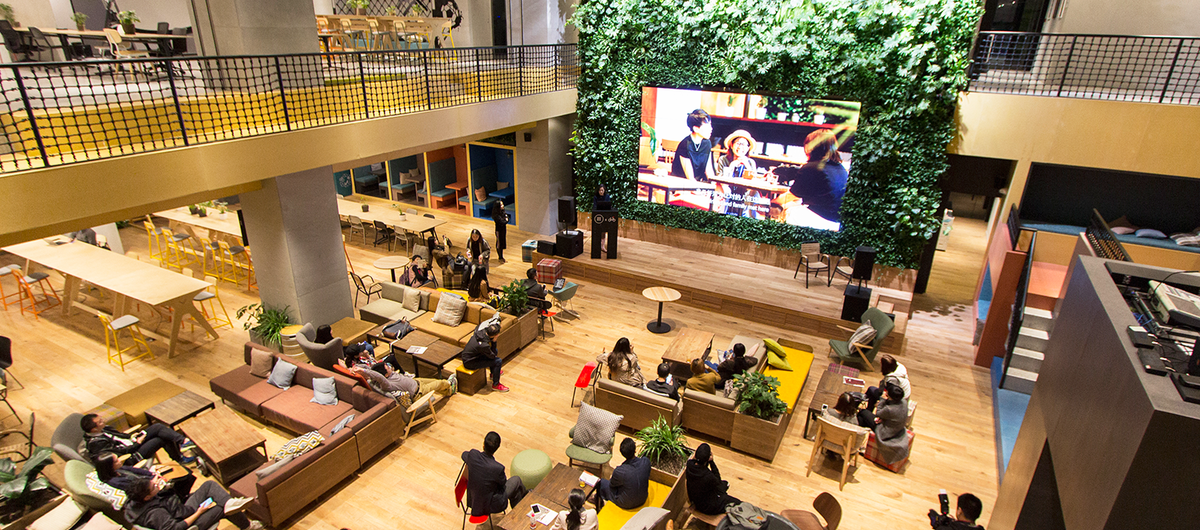It’s expected that more corporate companies will become coworking members over the next few years. Larger providers of company coworking spaces such as Mindspace, spanning Europe and Israel, host Microsoft and Samsung as corporate members. Serendipity Labs spans the US and similarly provides workspace to companies such as Amazon or General Electric.
It’s no surprise that providers increasingly experience higher numbers of corporate members when many corporate companies specifically integrate coworking into their business strategy. And the best part? It doesn’t begin and end with larger spaces. Even smaller providers, such as KAPTÁR, a coworking space in Budapest, run pilot projects with corporate companies to develop and establish relationships. But what exactly is driving these well-known, forward-thinking enterprises towards coworking?
Innovation and Collaboration
Innovation and collaboration are high on the agenda when it comes to corporate coworking. These two elements are commonly found in business strategies and act as fuel to the fire for companies wishing to establish a ’forward-thinking’ identity. Corporate brands differentiate themselves against competitors by associating themselves with technology, innovation and the sharing economy. Susan Harrison, Director of Sales and Enterprise Solutions at Serendipity Labs, notes that such companies are “automatically better positioned to capture innovative business opportunities by working from our space”.
Oded Israeli, Vice President of Marketing at Mindspace, further highlights how start-ups simultaneously benefit from working alongside large corporates: “Enterprises bring their distribution channels and mass market reach, experience in building scalable products and their deep industry know-how. Startups benefit greatly from having direct access to enterprise members in the office next door, or over lunch. They appreciate the enterprise’s validation for their solutions and our startup and agency customers often gain the larger companies as reputable customers for their products and services.”
Such statements are very much in line with industry research. 78% of corporate executives believe it is important to collaborate with entrepreneurs to encourage innovation, according to Accenture’s ‘Harnessing the Power of Entrepreneurs’ paper.
Corporate Economic Efficiency
Many corporates are turning towards coworking spaces to save money. Oded Israeli explains how this is a major driver for enterprises and the cost benefits and financial structures of these deals are often overlooked: “It’s no longer about the early adopters (the entrepreneurs, freelancers, and startups). Large enterprises understand the tangible, measurable benefits of locating entire teams at coworking spaces, and their appetite to use it more frequently increases accordingly.
According to him, coworking spaces can save companies 20-40% in costs compared to a lease for a regular office. This is especially true when a company expands into a new market and wants to do so quickly. By locating teams within coworking spaces, corporate companies avoid setup costs and overheads. They don’t need to worry about furniture, interior design, office cleaning or management fees. Everything is included. Innovation is not the only reason corporates are attracted to coworking; basic business principles are also driving this trend.”
This makes perfect sense when, according to Corporate Real Estate Trends, 77% of corporate real estate executives feel pressure from senior management to reduce real estate operating costs. 72% are also challenged on their presumed space needs. This pressure then translates into the main reasons businesses turn to shared spaces. The Global Occupier Survey shows that 45% of global occupiers use shared workplaces for the purpose of reducing costs and 41% do so to benefit from flexible lease terms. It’s therefore no surprise that the use of coworking space is expected to overtake the traditional serviced office by 2020.
Although the case for cost saving is strong, it cannot be generalised. KPMG’s Director of Coworking, Kirsty Mitchell, states “we do not use coworking spaces for the purpose of extending our own real estate, we primarily use them to get closer to the businesses inhabiting them. The true value of coworking comes from a holistic approach to a ‘managed office’, achieved by offering support networks and services. Without this, you simply have a flexible rental market with greater risks due to short notice periods.”
Despite this, Kirsty does acknowledge that “done well, coworking spaces can be more sustainable than traditional corporate real estate. As the trend for more flexible working continues to grow, we expect to see more corporate teams transitioning into coworking spaces as opposed to growing their own real estate footprint.”
▶ Next page: How Do Coworking Spaces Benefit?








